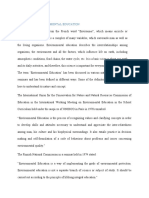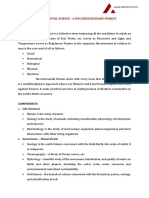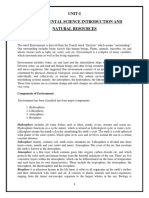0 ratings0% found this document useful (0 votes)
70 viewsMultidisciplinary Nature of Environmental Science
Multidisciplinary Nature of Environmental Science
Uploaded by
Aseel SMThe document discusses the multidisciplinary nature of environmental science. It states that environmental science draws from many fields like the physical and life sciences, economics, engineering, and law to study our natural surroundings. It also notes that environmental studies aim to promote understanding of the environment and address issues like pollution, conservation, and sustainability. Finally, the document outlines some of the key areas within the scope of environmental studies like natural resources, ecology, pollution control, and environmental management.
Copyright:
© All Rights Reserved
Available Formats
Download as PDF, TXT or read online from Scribd
Multidisciplinary Nature of Environmental Science
Multidisciplinary Nature of Environmental Science
Uploaded by
Aseel SM0 ratings0% found this document useful (0 votes)
70 views24 pagesThe document discusses the multidisciplinary nature of environmental science. It states that environmental science draws from many fields like the physical and life sciences, economics, engineering, and law to study our natural surroundings. It also notes that environmental studies aim to promote understanding of the environment and address issues like pollution, conservation, and sustainability. Finally, the document outlines some of the key areas within the scope of environmental studies like natural resources, ecology, pollution control, and environmental management.
Original Description:
MGU Core BCA S5 Unit 1-
Original Title
multidisciplinarynatureofenviroment
Copyright
© © All Rights Reserved
Available Formats
PDF, TXT or read online from Scribd
Share this document
Did you find this document useful?
Is this content inappropriate?
The document discusses the multidisciplinary nature of environmental science. It states that environmental science draws from many fields like the physical and life sciences, economics, engineering, and law to study our natural surroundings. It also notes that environmental studies aim to promote understanding of the environment and address issues like pollution, conservation, and sustainability. Finally, the document outlines some of the key areas within the scope of environmental studies like natural resources, ecology, pollution control, and environmental management.
Copyright:
© All Rights Reserved
Available Formats
Download as PDF, TXT or read online from Scribd
Download as pdf or txt
0 ratings0% found this document useful (0 votes)
70 views24 pagesMultidisciplinary Nature of Environmental Science
Multidisciplinary Nature of Environmental Science
Uploaded by
Aseel SMThe document discusses the multidisciplinary nature of environmental science. It states that environmental science draws from many fields like the physical and life sciences, economics, engineering, and law to study our natural surroundings. It also notes that environmental studies aim to promote understanding of the environment and address issues like pollution, conservation, and sustainability. Finally, the document outlines some of the key areas within the scope of environmental studies like natural resources, ecology, pollution control, and environmental management.
Copyright:
© All Rights Reserved
Available Formats
Download as PDF, TXT or read online from Scribd
Download as pdf or txt
You are on page 1of 24
Multidisciplinary Nature
of Environmental Science
SHAIKH SABINA MERAJ
ASSISTANT PROFESSOR
Y. B. CHAVAN COLLEGE OF PHARMCY
Environment
Environment is ‘a word which describes, in the
aggregate, all of the extrinsic (external) forces
influences and conditions, which affect the life, nature,
behaviour and the growth, development and maturation
of living organisms’.
‘Environment covers all the outside factors that have
acted on the individual since he began life’.
Environment is the aggregate of physical, chemical, biological
and social components on Earth which are capable of causing
direct or indirect effects in the short or long term on living and
non-living things and their interactions and activities.
Based on this enviroment is defined as the sum of total of water,
air and land ant the inter-relationship that exist among them and
with the human beings, other living organisms and materials.
Multidisciplinary Nature of Environmental Studies
The study of environmental components is multi
disciplinary in nature. Since it includes all disciplinary
such as science, humanities, commerce, meteorology,
climatology, geography and other disciplines.
Environmental studies is a multi disciplinary programme
created to promote the study of our natural surrounding.
Life sciences including botany, zoology, microbiology,
genetics, biochemistry, biotechnology help in understanding
the biotic components and their interactions.
The physical and chemical structure of the biotic components
and energy transfer and flow are understood with the help of
basic concept of physics, chemistry, atmospheric science and
oceanography.
Mathematics, statics and computer science serve as effective
tools in environmental modelling and management.
Economics, sociology and mass communication provides the
input for dealing with socio economic aspects associated with
various developmental activities.
A synthesis with environmental engineering, civil engineering
and chemical engineering form the basis for various
technologies dealing with the control of environmental
pollution, waste treatment and development of cleaner
technologies that are important for protection of environment.
Environmental laws provide the tools for effective
management and protection of the environment.
OBJECTIVES OF ENVIRONMENTAL
STUDIES
Creating the awareness about environmental problems in the students.
Giving basic knowledge about the environment and its related
problems to the students.
Developing an attitude of concern for the environment amongst the
students.
Motivating students to participate in environment protection and
environment improvement.
Acquiring skills to help the concerned individuals in identifying and
solving environmental problems.
SCOPE OF THE ENVIRONMENTAL STUDIES
Scope of the environmental studies is broad based and it
encompasses a large no of areas and aspects broadly listed
below.
1. Natural resources–their conservation and management
2. Ecology and biodiversity
3. Environmental pollution and control
4.Social issues in relation to development and
environment
5. Human population and environment
Natural resources-conservation:- Natural aspects such as
forests contribute towards maintaining a balance in the
environment, managing and maintaining of forests and
wild life is an important task under natural resources
conservation.
Ecosystem structure and function:- The study of the
ecosystem mainly consists of the study of the processes
that link with the biotic components to the non living (or)
abiotic components.
Environmental pollution and control:- With the knowledge of
the environmental science one can look for methods to control
pollution and manage waste effectively.
Environmental management:- There are several independent
environmental consultants working with the central and state
pollution control boards. These consultants offer advice related
to environment problems and their solutions. The consultants
involved in policy making, pollution control and maintenance
of ecological balance
Research and development:- With increase in public
awareness, regarding environment issues, there is
tremendous scope for research and development in this
field. They conduct research studies in order to develop
theories of monitoring and controlling environment.
Environmental journalism:- There is an increasing
demand for people who can report on environment issues
to generate awareness among people. Environmental
journalism is an emerging field which helps in bringing
environmental problems to public notice.
Industry:- Environmental scientists work towards
maintaining ecological balance, conservation of bio
diversity and preserve the natural resources. Rapid
industrialization is increasingly degrading the
environment to minimize this, there is a growing trend
towards manufacturing of “green” goods and products.
NEED FOR PUBLIC AWARENESS
Environmental pollution is effecting on plant, animals and
human life. The soil, minerals, water, fuel, plants and
animal resources are being depleted and climatic changes,
desertification and floods are becoming drastic.
More over, the human population is growing faster than
ever and creating more pressure on the environment.
More of the environmental problems are global in nature
therefore every citizen of the world needs to be aware and
actively participate in protecting in protecting global
environment for participation, public awareness is
essential.
OBJECTIVES OF PUBLIC AWARENESS
It can be introduced as a course in school and colleges. It
is the most successful method of propagating
environmental awareness.
This course spread awareness regarding the protection of
the environment.
A government at its own level cant achieve the goals of
sustainable development until the public has a
participatory role in it.
The public has to be educated about the fact that if we
degrading our environment we are actually harming our
own selves.
THROGH MASS MEDIA
Mass media as news papers, magazines, radios, t v etc.,
can play an important role in educating the masses
regarding environmental problems and issues.
Through organizing seminars and conferences, organizing
meeting seminars, and conferences at various levels help
in spreading environmental information to general public.
Awareness can also be spread by organizing various
competitions on environmental problems, non
conventional energy sources etc., such competitions may
also help in disseminating information regarding various
environmental issues.
ENTERTAINMENT
Environmental awareness can also be propagating through
folk songs, street plays, documentaries etc.,
IMPORTANCE OF ENVIRONMENTAL STUDIES
1) Environmental studies helps maintain ecological balance by
providing a basic operating knowledge of environmental system
and processes.
2) It gives information regarding the changes that takes place due to
anthropogenic factors and helps gain skills of analysing various
environmental system and the effect of human activities on them.
3) Environmental studies help to achieve sustainable development
and understand the relationship between development and the
environment.
4) This discipline helps to educate people regarding their duties
towards environmental protection.
5)Environment is one subject that is actually global in nature.
6) Environmental study deals with the analysis of the processes
in water, air, land, soil, and organism which leads to pollution
(or) environment degradation.
7) It also deals with the most important issues like safe and clean
drinking water, hygienic living conditions, clean and fresh air,
healthy food for man and for development.
8) The discipline provides us with basic knowledge of the
environment and various environmental issues. It examines the
scientific basic for environmental and social concerns about
our present energy needs, global climate changes, toxic
emission and waste disposal.
9) It also provide knowledge about the development and
utilisation of energy resources and the role of public
policy there in.
10) Environmental law, business administration and
environmental engineering are emerging as new career
opportunities for environment protection and
management.
11)Environmental studies also aims to protect bio diversity
growth in human population and the resulting increase in
material consumption and technological development
have increased the rate and scale of degradation of the
environment.
12) The concepts from environmental studies can be applied
to the study of agriculture and the design of sustainable
production system.
13) With the pollution control laws becoming more
strengthen, are finding it difficult to dispose off the
produced wastes.
OUTCOMES OF ENVIRONMENTAL STUDIES
Illustrate Depleting Nature of Environmental Resources, Global
Environmental Crisis and the concept of Ecosystem
Adapt to the concept of 3R (Reuse, Recovery, Recycle).
Suggest different control measures related to Environmental Pollution.
Illustrate and analyse various Case Studies related to Environmental
Legislation.
Demonstrate the working of Renewable Energy sources.
Illustrate the Techniques of Disaster Management and Green Building
Thank you
You might also like
- Introduction Experimental Strength of MaterialsDocument53 pagesIntroduction Experimental Strength of Materialsgorefest123No ratings yet
- TEST CHP 1-2Document21 pagesTEST CHP 1-2Andini OleyNo ratings yet
- Lecture Notes - Evs Unit - 1Document5 pagesLecture Notes - Evs Unit - 1Nambi Rajan100% (3)
- Unit - 1 Lecture 1Document57 pagesUnit - 1 Lecture 1Suneel KumarNo ratings yet
- Evs Unit-I 2Document21 pagesEvs Unit-I 29tytmrx5zjNo ratings yet
- Unit - I: Introduction To Environmental Studies and EcosystemDocument79 pagesUnit - I: Introduction To Environmental Studies and EcosystemDina GaranNo ratings yet
- Environmental Chemistry ClassnotesDocument76 pagesEnvironmental Chemistry Classnotesdishant sarangalNo ratings yet
- Unit 1 (Part-1)Document25 pagesUnit 1 (Part-1)Avner ɸNo ratings yet
- Unit I-FundamentlsDocument19 pagesUnit I-FundamentlsRidhi GuptaNo ratings yet
- Multidisciplinary Nature of Environmental Studies PDFDocument6 pagesMultidisciplinary Nature of Environmental Studies PDFanu100% (2)
- Multidisciplinary Nature of Environmental StudiesDocument6 pagesMultidisciplinary Nature of Environmental StudiesWiz Calvin ManutdNo ratings yet
- Ema 111Document5 pagesEma 111bulukuian50% (1)
- Module 3Document18 pagesModule 3ಪ್ರಜ್ವಲ್ ಸಾಗರ್No ratings yet
- Unit-1 Environmental StudiesDocument26 pagesUnit-1 Environmental StudiesRahul RanjanNo ratings yet
- Chapter 1 Introduction To Environmental Science Group 1Document40 pagesChapter 1 Introduction To Environmental Science Group 1Jhimi Rose MaraonNo ratings yet
- Environmental StudiesDocument26 pagesEnvironmental StudiesSatya vratNo ratings yet
- Environmental Studies: Meena KapahiDocument13 pagesEnvironmental Studies: Meena Kapahimanya_kapoorNo ratings yet
- Evs Notes 2Document90 pagesEvs Notes 2Ashok Kumar100% (1)
- Module 1 EnvironmentDocument9 pagesModule 1 EnvironmentVidhyashree YadavNo ratings yet
- Module 3Document20 pagesModule 3Praveen DNo ratings yet
- Environmental Science Week No.1 2Document18 pagesEnvironmental Science Week No.1 2Mayla G. BalayonNo ratings yet
- Lesson NotesDocument9 pagesLesson NotesMartin NgechuNo ratings yet
- Chapter 1 Evs NotesDocument42 pagesChapter 1 Evs NotesNaruto KunNo ratings yet
- Environmental Studies (First Pages)Document9 pagesEnvironmental Studies (First Pages)shaista rafiqueNo ratings yet
- Environmental Factors Environmental DegradationDocument15 pagesEnvironmental Factors Environmental Degradationrozyshahid2001No ratings yet
- B.Tech ECE UNIT I&IIDocument33 pagesB.Tech ECE UNIT I&IIShivam PatelNo ratings yet
- Notes 1Document26 pagesNotes 1BoyNo ratings yet
- Unit 1,2 & 3 EvsDocument45 pagesUnit 1,2 & 3 EvsKanisha KNo ratings yet
- Module 2 IMPT OF ENVI SCIE RELATED FIELD OF SCIDocument14 pagesModule 2 IMPT OF ENVI SCIE RELATED FIELD OF SCIMichelle Gutierrez SibayanNo ratings yet
- Brief Notes For EvsDocument134 pagesBrief Notes For EvsSelvakapoorNo ratings yet
- Environment, Scope, Public AwarenessDocument25 pagesEnvironment, Scope, Public AwarenessAshyy100% (1)
- Unit 1 Topic 1Document3 pagesUnit 1 Topic 1hanishi shahNo ratings yet
- Scope and Importance of Environmental StudiesDocument5 pagesScope and Importance of Environmental Studiesonline classes75% (4)
- Lecture1. Scope and Importance of Environmental StudiesDocument13 pagesLecture1. Scope and Importance of Environmental StudiesThangaGiri BaskaranNo ratings yet
- Environment: Module 1 - Environmental Science - A Multidisciplinary SubjectDocument87 pagesEnvironment: Module 1 - Environmental Science - A Multidisciplinary SubjectALAN SIBY JUNo ratings yet
- Environmental Science, GeographyDocument5 pagesEnvironmental Science, GeographyJethro Hechanova LapuraNo ratings yet
- 22018.chapter 1 Study MaterialDocument16 pages22018.chapter 1 Study MaterialgshreyaNo ratings yet
- A Comparative Study of Environmental AwaDocument18 pagesA Comparative Study of Environmental AwajitendraNo ratings yet
- t1 NotesDocument11 pagest1 NotesKabeerNo ratings yet
- Theory 2019Document243 pagesTheory 2019Ponvizhi RamyaNo ratings yet
- Unit 1 (Evs)Document24 pagesUnit 1 (Evs)Navjot Kaur MahiNo ratings yet
- Unit-1 EvsDocument6 pagesUnit-1 Evssnehamaharana236No ratings yet
- UNIT 1A - Multidisplinary Nature of Environmental Studies-2Document4 pagesUNIT 1A - Multidisplinary Nature of Environmental Studies-2Abinash BoruahNo ratings yet
- Environmental Science 1Document275 pagesEnvironmental Science 1neha.tanveer5765No ratings yet
- EVS (Unit-I)Document6 pagesEVS (Unit-I)DeveshPandeyNo ratings yet
- Environmental Science 1-4-96Document93 pagesEnvironmental Science 1-4-96deepakNo ratings yet
- Definition of Environmental StudiesDocument5 pagesDefinition of Environmental Studiesankit pandeyNo ratings yet
- NATURE, Scope and Importance of Environmental StudiesDocument5 pagesNATURE, Scope and Importance of Environmental StudiesSoumendra RoyNo ratings yet
- Environmental Studies - Study MaterialDocument112 pagesEnvironmental Studies - Study Materialnithutg486No ratings yet
- Unit 1Document33 pagesUnit 1Sristi TyagiNo ratings yet
- Unit (1,2,3) - EVSDocument97 pagesUnit (1,2,3) - EVSsid80399No ratings yet
- Lecture 2 Environmental StudiesDocument6 pagesLecture 2 Environmental Studiesrajprashant13939No ratings yet
- Scope & Importance / Significance of Evs: Introduction To Environmental Science and Engineering (EVS)Document7 pagesScope & Importance / Significance of Evs: Introduction To Environmental Science and Engineering (EVS)preethikabhaskarNo ratings yet
- Evs CH1Document21 pagesEvs CH1aavvvNo ratings yet
- Environmental Studies - Unit 1 Entire UnitDocument53 pagesEnvironmental Studies - Unit 1 Entire UnitRudyNo ratings yet
- Ens Ug TnauDocument266 pagesEns Ug TnauGanesh SarodeNo ratings yet
- EVS, NotesDocument81 pagesEVS, NotesANANT AGGARWALNo ratings yet
- UNIT-1 Multidisciplinarynatureofenvironmentalstudies: Er - Subratbisoyi & Er. D.K Maharana Dept - Ofelectrical Gse, BerhampurDocument70 pagesUNIT-1 Multidisciplinarynatureofenvironmentalstudies: Er - Subratbisoyi & Er. D.K Maharana Dept - Ofelectrical Gse, Berhampurprajapatisavitur318No ratings yet
- MDC Environmental and Ecological ManagementDocument106 pagesMDC Environmental and Ecological Managementboliwalkaran7No ratings yet
- Ecosystems and Human Well-Being: A Manual for Assessment PractitionersFrom EverandEcosystems and Human Well-Being: A Manual for Assessment PractitionersNo ratings yet
- Mastering Ecology: A Comprehensive Guide to Understanding and Protecting the EnvironmentFrom EverandMastering Ecology: A Comprehensive Guide to Understanding and Protecting the EnvironmentNo ratings yet
- (IJCST-V11I4P15) :M. I. Elalami, A. E. Amin, S. A. ElsaghierDocument8 pages(IJCST-V11I4P15) :M. I. Elalami, A. E. Amin, S. A. ElsaghierEighthSenseGroupNo ratings yet
- SocialWorkFieldInstructionProgram ResearchDocument15 pagesSocialWorkFieldInstructionProgram ResearchALBERT ALGABRENo ratings yet
- Saint Clare Polytechnic School of Burauen Inc.: Brgy. Maghubas Burauen, LeyteDocument3 pagesSaint Clare Polytechnic School of Burauen Inc.: Brgy. Maghubas Burauen, LeyteAlex GinNo ratings yet
- Chapter 3 Part 2Document8 pagesChapter 3 Part 2Adrian Perolino MonillaNo ratings yet
- Learning Episode 3Document7 pagesLearning Episode 3John Rolan SallanNo ratings yet
- Verbs Used in Acca Exam PapersDocument7 pagesVerbs Used in Acca Exam PapersACCAbooksNo ratings yet
- Lecture #4 - KPE190 - September 29thDocument20 pagesLecture #4 - KPE190 - September 29thjuhi patelNo ratings yet
- Chap 2 PPT Lec MoR - The Research ProblemDocument43 pagesChap 2 PPT Lec MoR - The Research ProblemDinah Jane MartinezNo ratings yet
- Social, Environmental, and Other Life Factors (S.E.L.F) : Nature vs. NurtureDocument3 pagesSocial, Environmental, and Other Life Factors (S.E.L.F) : Nature vs. NurtureKryslane Ariz IINo ratings yet
- Write Present Texts - REVDocument37 pagesWrite Present Texts - REVIntergrated PicturesNo ratings yet
- EDUC5210 Week 8 Discussion Question Unit 8Document3 pagesEDUC5210 Week 8 Discussion Question Unit 8Meleisa WrayNo ratings yet
- Cover-Daftar IsiDocument15 pagesCover-Daftar IsiDanang Tri HatmokoNo ratings yet
- Universal Design For Learning Activity - Equivalent Fractions - Grade 3Document3 pagesUniversal Design For Learning Activity - Equivalent Fractions - Grade 3Mary CarlsonNo ratings yet
- Instructional Theories in Adapted Physical EducationalDocument24 pagesInstructional Theories in Adapted Physical EducationalFloieh QuindaraNo ratings yet
- Hard and Soft Skills For TeachersDocument20 pagesHard and Soft Skills For TeachersOmar AlfaroNo ratings yet
- Database For Children With Valid Foster Care Orders - Vergenoeg 2023Document4 pagesDatabase For Children With Valid Foster Care Orders - Vergenoeg 2023meryke davidsNo ratings yet
- Hilario-Marvin S - FS2 - E-Portfolio-FinalDocument44 pagesHilario-Marvin S - FS2 - E-Portfolio-FinalMARVIN HILARIONo ratings yet
- The Scope of Curriculum ReportDocument4 pagesThe Scope of Curriculum ReportDarlene OrbetaNo ratings yet
- UPDATED Internship Report - Mini Project FormatDocument9 pagesUPDATED Internship Report - Mini Project Formatmeetalisingh00No ratings yet
- Modalité Épistémique Et Discours ScientifiqueDocument336 pagesModalité Épistémique Et Discours Scientifique张丽颖No ratings yet
- (DOC) HOA4 - SyllabusDocument9 pages(DOC) HOA4 - SyllabusJanina CincoNo ratings yet
- Pengetahuan Lingkungan Kesadaran Lingkungan Dan Perilaku Pro LingkunganDocument9 pagesPengetahuan Lingkungan Kesadaran Lingkungan Dan Perilaku Pro LingkunganMelisha EfrianiNo ratings yet
- Session 1 - Group and Team Overview - Lesson 1 - Defining Teams and GroupsDocument33 pagesSession 1 - Group and Team Overview - Lesson 1 - Defining Teams and GroupsNam NguyễnNo ratings yet
- Programma WBN0Document4 pagesProgramma WBN0Mohamed ElsaadawiNo ratings yet
- Truth FalseDocument16 pagesTruth FalseГалина КопачинскаяNo ratings yet
- Artificial IntelligenceDocument16 pagesArtificial Intelligenceikechukwuchinonso537No ratings yet
- HRD Audit and Its MethodologyDocument21 pagesHRD Audit and Its Methodologyarunabh googiNo ratings yet
- Module 1 Introduction To Industrial EngineeringDocument49 pagesModule 1 Introduction To Industrial EngineeringPratik PhadkeNo ratings yet

























































































